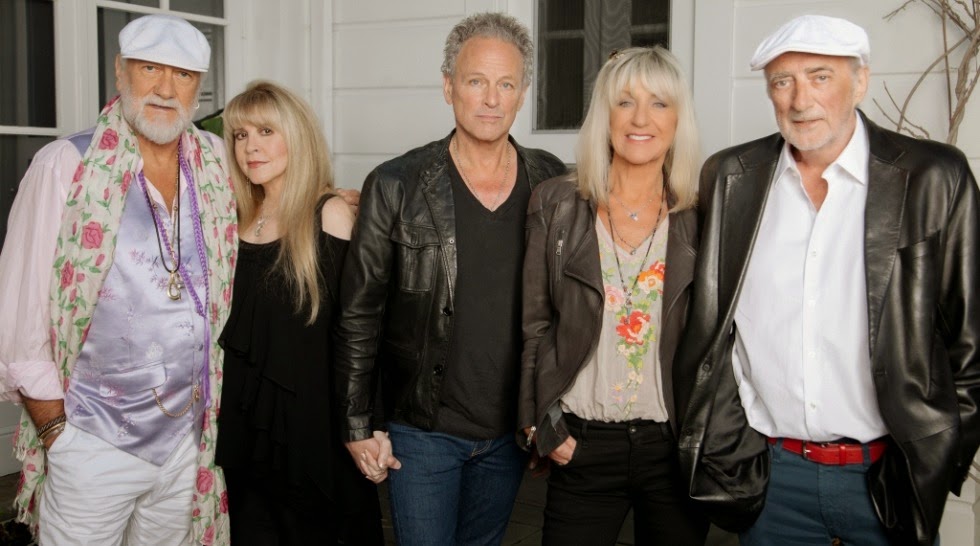Jon and I went to see Fleetwood Mac in concert during the week.
As I waited for the band to come on stage, I was feeling a bit sleepy, and I was wondering whether maybe I was getting a bit old for going to concerts. This feeling lingered at the beginning of the concert, but I also got the feeling that the band was a bit slow to get started, too. I could well understand it: most of the members are even older than me, and this was their 114th show of the tour. That’s a lot of performances.
However, as the music continued, both the band and I seemed to wake up, and by the end of the concert, I was feeling more alive and awake than I had done for weeks.
At one stage during the concert, Stevie Nicks thanked the audience for the connection, and I realised that this is the reason that live concerts are loved by bands and fans alike. As the band plays and sings, they connect with the Divine mind, within not only themselves, but within the audience as well. The band becomes one with the audience and with the Divine.
I felt great joy after the show, and I am sure that the rest of the audience and the band felt the same way.
I was reminded of something that had gone around facebook some time ago, which quoted a shaman asking the questions: “When did you stop singing? When did you stop dancing? When did you stop sitting in silence?” The quote alluded that depression was a result of forgetting these things.
Whilst I had been remembering to sit in silence twice a day during meditation, I realised that I had been forgetting the other ways to connect with God, and therefore forgetting the other ways to find joy.
Seen in this light, it seems surprising that some religious groups have banned dancing, until you understand that the purpose of religion is control. If people could connect with the Divine through singing, dancing and meditation, what need would there be of religions?
Authentic indigenous communities have not forgotten these ways to connect to the Divine. They incorporate singing and dancing into their ceremonies, as evidenced by the Aboriginal corroborees. Similarly, dancing and singing are integral to Native American ceremonies.
In our western society, dancing, particularly, is associated more with the young. Night clubs, for instance, tend to play music for the younger ear. Whilst there are a lot of old fogies who incorporate dancing into their lives, many, like me, focus more on enjoying the silence. Others have forgotten all of these methods of connection and watch TV instead. In our modern society, even silence can be hard to find.
When Europeans arrived into Australia and North America, they imposed their civilisation onto the native populations. They looked upon the natives as ignorant savages who needed to be taught how to live appropriately. Many people within indigenous communities believed the Europeans and lost their connection to their native culture. Hopefully there is still enough of the cultural knowledge left within these communities to retrain their young, but also to teach the rest of us.
Europeans who took over these countries never stopped to think that the indigenous populations would have anything to teach them. Today, many of us understand that, in order to evolve towards a world where everyone can live in peace in harmony, we need the knowledge gained within both European and indigenous cultures.
We, of western descent, need to admit that there is much that we can learn from indigenous peoples. Not least of which would be how to live in harmony with the Earth. Whilst there is no way to turn the clock back to pre-colonial days, in today’s global society, we cannot move forward without taking everyone with us. To do that, we need to learn from each other.
Rather than insisting that everyone change their culture to be the same as ours, why not open our minds to learn the best from each others’ cultures.
This doesn’t mean that we should blindly accept cultural traditions which we consider to be detrimental to another’s well-being. Cannibalism has been eradicated from a number of cultures. Hopefully genital mutilation and child marriage will be eradicated from those cultures where these are still practised.
Education and sharing of knowledge is the key, but cultural changes cannot be imposed as colonial Europeans tried to do, from without. They must be the result of a change in the hearts of the members of those communities.
As we look at how we can move forward towards a better future, as well as embracing the positive aspects of other cultures, we have to be willing to eradicate the barbaric practices in our own culture as well. There are many such practices within our culture, which are detrimental to others’ well-being.
One example which comes to mind is factory farming. How can we harshly judge a culture which packs dogs into small cages prior to an inhumane slaughter, when our culture does the same to pigs?
How can we harshly judge a culture which loads sheep into boots of cars and slaughters them in fear in the street, when our culture knowingly sends those sheep to meet such a fate?
As Jesus said in Matthew 7:1-5, you have to first take the log out of your own eye, before you can see clearly enough to take the speck out of your brother’s eye.
Perhaps if we all make it a practice to sing, dance, and partake of silence regularly, we will have such a strong connection with the Divine that we will know the best way to both find the log in our own eyes, and help our brothers to remove the small specks from theirs.
Break out those Fleetwood Mac albums everybody!
https://www.youtube.com/watch?v=KcdFRs4xg5Q
(Wow, those didgeridoo players are amazing, aren’t they?)
https://en.wikipedia.org/wiki/Dancing_ban
https://www.biblegateway.com/passage/?search=Matthew+7%3A1-5&version=ESV


Leave A Comment